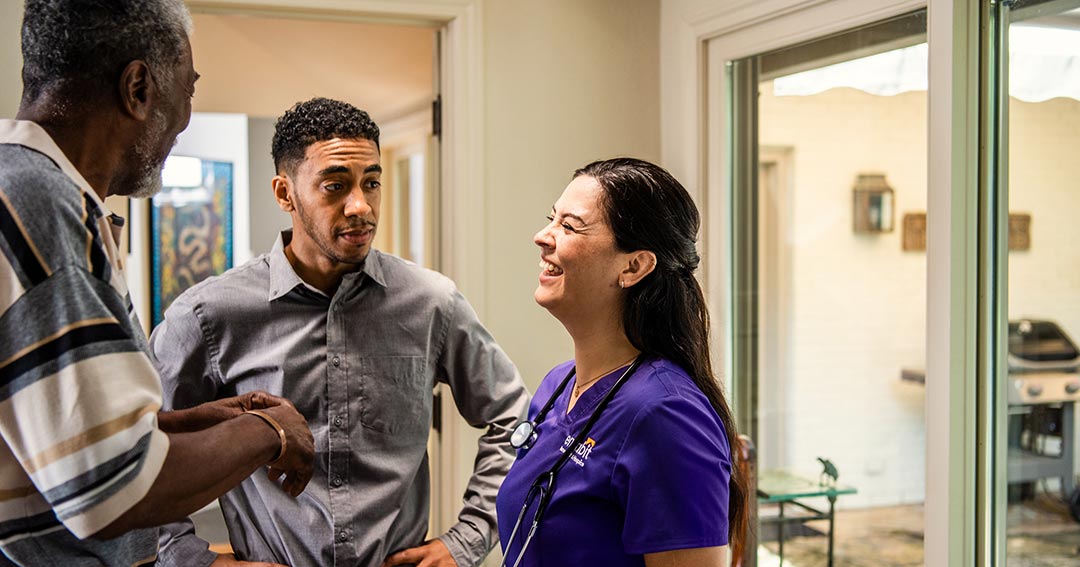Having worked in the home health industry for almost 20 years, I have witnessed a drastic shift firsthand – more and more people are preferring health care in the comfort of their own homes.
Receiving health care wherever you call home is one thing. Receiving high-quality, compassionate care focused on helping you achieve your specific goals is the most important thing.
There are many providers and ways to receive care so I know it can feel overwhelming if you are trying to make a decision. However, there are a few things you can keep top-of-mind whenever thinking about who you want to provide your or your loved one’s care.
Here are a few questions to ask yourself when looking for a high-quality home health provider.
Is the provider Medicare-certified?
Medicare-certified providers are required to meet certain standards of care and are routinely inspected to ensure compliance. Choosing a Medicare-certified agency, such as Enhabit Home Health & Hospice, means you will receive high-quality care that helps you meet your specific health care goals.
Medicare will also cover the cost of home health care, as long as you meet the qualifying circumstances.
Are your specific health care needs addressed through the provider’s services?
As mentioned, there are many options when it comes to types of care and services offered. Some patients may need specialty focused care, for example post-operative rehabilitation or post-hospitalization cardiopulmonary care, while others may need assistance safely transitioning from a skilled nursing facility back home.
No matter the type of care you are looking for, it is important to find a provider that specializes in the services you need and offers interdisciplinary care.
At Enhabit, our skilled clinicians come from a variety of disciplines and fields of expertise. But ultimately, their goal is to help patients actively manage their own recovery. This often lowers their chances of hospital readmission as well.
Enhabit provides evidence-based, disease-specific clinical pathways to ensure you or your loved one receives the best possible outcome. These specialty programs include:
- Post-Operative
- Balance & Fall Prevention
- Cardiopulmonary
- Community Care
- Care Transitions
- Care Connections
Learn more about Enhabit’s specialty programs here.
Does your physician, surgeon or hospital discharge planner recommend a high-quality home health provider?
Your care teams have built relationships over the course of their careers. Ask them which providers they recommend. They’ll know which ones are best to work with and which ones deliver the best outcomes.
Ideally, you will want to work with a provider that has a long-standing reputation and is well-known and trusted by other health care providers.
Enhabit has worked in various communities across the nation for over two decades, building strong relationships, gathering positive patient testimonials and seeing superior outcomes.
Will they meet your unique needs, whether emotional, psychosocial or physical?
Home health care is not a “one-size-fits-all” proposition. It’s best to look for a home health team who can wrap all of their resources around each patient. This ensures every need gets met, no matter how big or small.
Medicare-certified providers offer an interdisciplinary care team to meet the wide-ranging needs of patients and their families. These skilled individuals include:
- Skilled nurses
- Occupational therapists
- Medical social workers
- Physical therapists
- Speech language pathologists
- Home health aides
The interdisciplinary home health care team at Enhabit worked together to help Jane learn a new skill that would change her life.
Do they offer support outside of medically-related issues?
Oftentimes, a patient’s journey to better health may encounter obstacles that don’t necessarily have to do with medically-related issues. They might be facing a lack of resources preventing them from securing appropriate items for their care. Or maybe they are facing poverty and can’t afford to pay their bills or get transportation to their physician.
Whatever the issue may be, providers can get patients in touch with medical social workers who will connect patients to whatever community resources they may need.
At Enhabit, we have been connecting patients with their communities for over 20 years. We’ve helped those in our care access food pantries, receive emotional care from support groups, develop friendships at community centers and so much more.

Do they offer personal care services, if needed?
Although personal care isn’t covered by Medicare Part A, if you have a skilled need and require personal care in addition to your medical care, providers can supply home health aides.
Home health aides are critical to a patient’s care journey as they keep patients safe and healthy, prevent hospitalizations and help improve quality of life.
Enhabit is working on building collaborative relationships between other home-based care providers.
This ensures that whenever a patient needs a particular service that we don’t offer – like personal care without a skilled need – we can connect the patient with our ecosystem of resources. That way, every patient receives the right care, at the right time, even if we aren’t the ones directly providing the care.
Are they seen as a high-quality home health provider in the community?
Besides the recommendation of your care teams, there are other ways to discover if a provider has good standing or not.
The Medicare care compare search tool lets you search by provider or by location, allowing you to see the quality ratings and patient experiences of agencies near you.
While Star Ratings are a great way to judge the quality of care a home health provider offers, there are other metrics you can compare and contrast as well. These metrics include acute care hospitalization rates and patient satisfaction.
Keep in mind, quality metrics are always helpful to judge the efficacy of a provider’s care. But patient testimonials can really highlight the quality of care a patient and their loved ones receive.
Have they gone over specific costs of your care?
While Medicare does cover home health services if you meet the qualifying circumstances, there may be certain aspects of your care that aren’t covered.
Medicare has specific requirements for what they will and will not cover. It is important that your home health provider reviews all of your coverages with you. That way, they can tell you any out-of-pocket costs upfront.
The importance of choosing a high-quality home health provider
In an age where home-based care is growing more popular with older adults, there are a lot of home health providers out there.
A high-quality home health provider can change the trajectory of someone’s life. That’s why it is so important to me that you choose one that fits your specific health care needs.
In addition to printing out this article, you can download the Medicare-coverage checklist. Bring these resources with you to your physician. Then, you can feel confident that you know how to choose a high-quality home health provider.
At Enhabit, our promise is to provide a better way to care to every patient wherever they call home. Visit our website to find a location near you and talk to your physician about a referral to our services.
 Back to Resource library
Back to Resource library
Browse top categories
Social Share
At Enhabit our patients are our number one priority. From providing the latest medical practices to building deep personal connections, we’re focused on upholding every patient’s dignity, humanity and sense of control on their health care journey.
Home health
Our home health services give patients access to the care they deserve in the comfort of their own homes. From disease and injury management to recovery from surgery, our clinicians help patients confidently achieve their healthcare goals.
Hospice care
Our hospice care services place importance on the comfort of every patient living with a terminal illness. Our caring professionals are dedicated to providing not just physical care, but spiritual and emotional support to every patient and their loved ones.






